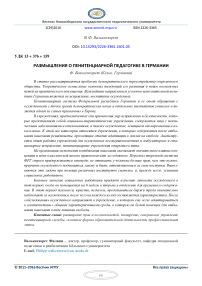Thoughts about an ethical management of penal institutions
Автор: Walkenhorst Philipp
Журнал: Science for Education Today @sciforedu
Рубрика: Педагогические и психологические науки
Статья в выпуске: 1 (29), 2016 года.
Бесплатный доступ
Both, the German Prison Act and the Youth Courts Law empower a life in freedom without committing offence as well as social responsibility. In particular the employees of the General Penal Service accompanying the detainees in their everyday life are granted an essential pedagogical role with regard to the basic forms of educational activities and the perpetual life-long development of each human. Being officials, they are required to represent the basic values of democracy and human rights. In many cases the employees´ occupational choice cannot be attributed to a pedagogical motivation as it runs the risk of pedagogy and encouragement fading into the background. This is why the prison practice has to be enriched with professional ethics.
Empowerment, general penal service, basic forms of educational activities, professional ethics, encouragement, educational methodologies, value systems
Короткий адрес: https://sciup.org/147137701
IDR: 147137701 | УДК: 13 | DOI: 10.15293/2226-3365.1601.05
Список литературы Thoughts about an ethical management of penal institutions
- Strafgesetzbuch (StGB) in der Fassung vom 13. November 1998 (BGBl. I S. 3322), zuletzt geändert durch Art. 1 des Gesetzes vom 23. April 2014 (BGBl. I S. 410).
- Bundesverfassungsgericht vom 31.05.2006 -2BvR 1673/04; 2 BvR 2402/04.
- Giesecke, H. (2010): Pädagogik als Beruf -Grundformen pädagogischen Handelns. Weinheim (10. Auflage).
- Lang, F. R., Martin, M. & Pinquart, M. (Hrsg.) (2012): Entwicklungspsychologie -Erwachsenenalter. Göttingen.
- Faltermaier, T., Mayring, Ph., Saup, W. & Strehmel, P. (2013): Entwicklungspsychologie des Erwachsenenalters. Stuttgart (3., vollständig überarbeitete Auflage).
- Laubenthal, K. (2011): Strafvollzug. Heidelberg (6. neu bearb. Auflage).
- Herrmann, W. (1926): Das Hamburgische Jugendgefängnis Hahnöfersand: Ein Bericht über Erziehungsarbeit im Jugendstrafvollzug. (Neuauflage: Hannover 1997).
- Aurin, K. (Hrsg.) (1990): Was ist eine gute Schule? Bad Heilbrunn.
- Lehmann, A. & Greve, W. (2003): Justizvollzug als Profession. Herausforderungen eines besonderen Tätigkeitsbereiches. Befragung der Mitarbeiterinnen und Mitarbeiter im niedersächsischen Justizvollzug. Hannover: Kriminologisches Forschungsinstitut Niedersachsen.
- Böhm, A. (2003): Strafvollzug. Neuwied (3. neu bearb. Auflage).
- Böhm, A. (1992): Erziehung durch stationäre Maßnahmen? In: Informationsdienst Neue Folge 2 (1992), H.5, 2-10 (Hrsg.: Regionalgruppe Hessen in der Deutschen Vereinigung für Jugendgerichte und Jugendgerichtshilfen e.V.).
- Herzog, J. (2013): Die schwierige Rolle der Führungskräfte im Allgemeinen Vollzugsdienst (AVD). In: Forum Strafvollzug Jg. 62, Nr. 3, S. 154-158.
- Bögemann, H. (2003): Gesundheitsförderung in totalen Institutionen am Beispiel einer geschlossenen Justizvollzugsanstalt. Bielefeld. (Univ., Diss.)
- Brezinka, W. (1993): Erziehung in einer wertunsicheren Gesellschaft, München, Basel.
- Radbruch, Gustav/Kaufmann, Arthur ; Spendel, Günter (1991): Gesamtausgabe/Gustav Radbruch Band 17: Briefe I (1898-1918). Heidelberg: Müller; Jur. Verlag


